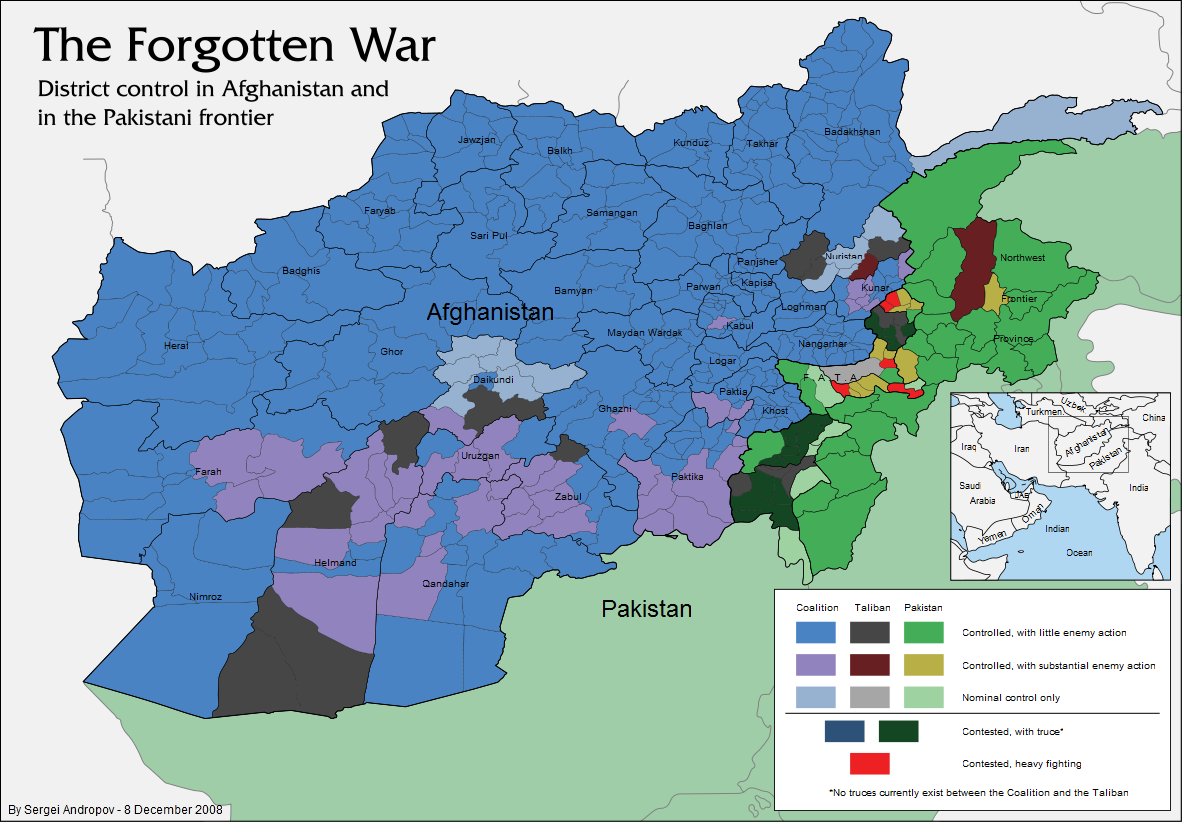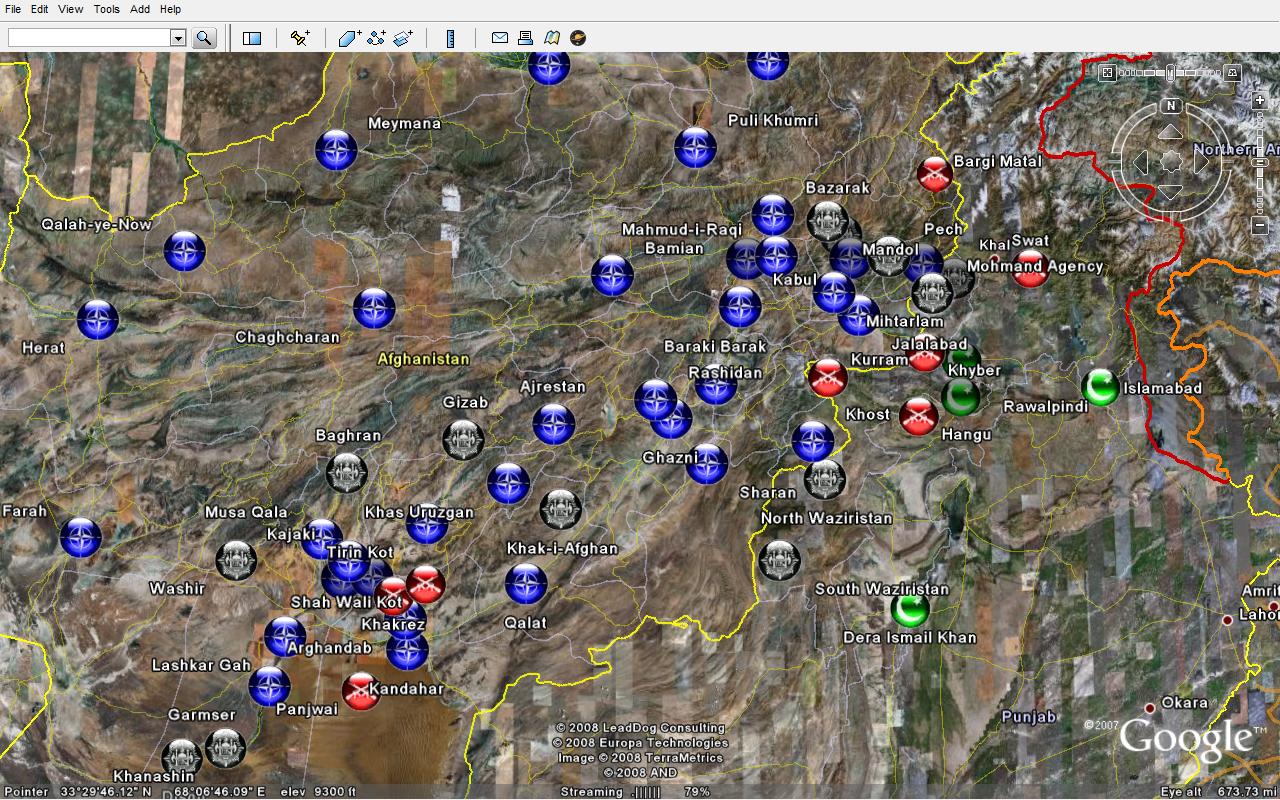
(Click for full size image.)
At long last, Tʜᴇ Mᴀᴘ is complete.
Due to the narrow width of Blogger's columns, I'm almost certainly going to have to migrate to WordPress.
"This enemy attacked not just our people, but all freedom-loving people everywhere in the world. The United States of America will use all our resources to conquer this enemy. We will rally the world. We will be patient, we will be focused, and we will be steadfast in our determination...." —President George W. Bush, September 11, 2001

In a second battle in Helmand province, Afghan and international troops retook the Nad Ali district centre - which had been held by fighters - during a three-day fight, Ahmadi said.
That battle, which also involved airstrikes, ended on Saturday and resulted in the death of 40 Taliban fighters, officials said.
Afghan police and soldiers were now in control of the district centre.
Nato said its aircraft bombed fighters after they were seen gathering for a major attack, killing "multiple enemy forces".
"If the fighters planned a spectacular attack prior to the winter, this was a spectacular failure," Richard Blanchette, an Isaf spokesman, said.
Taliban claim to have forced NATO-led troops from a remote district
THE NATO-led International Security Assistance Force (ISAF) has withdrawn from a district in the north-eastern province of Nuristan, the international force said.
ISAF said it retreated from its forward operating base in the Kamdish district on Friday following advice from Afghanistan’s Defence Ministry.
But the Taliban claimed that it forced ISAF troops in the district to retreat after engaging them in fierce fighting in the district, one of the country’s most insecure.
US wants to reduce dependence on government by arming militias
THE UNITED States plans to arm tribal militias against the Taliban, US Defence Secretary Robert Gates said at a NATO summit in Hungary.
As part of a plan to create greater co-operation on both sides of the Afghan-Pakistani border, the US wants to train tribal militias in an attempt to reduce its dependence on the central government in Kabul.
Parliament members had already suggested arming the tribes, but the idea was not given any currency at the time.
 Finally.
Finally.Every step the Democrats in Congress have taken to force the withdrawal of U.S. forces from Iraq has failed. Time and again, President Bush beats them into submission with charges of failing to "support the troops."
Why do the Democrats allow this to happen? Because they let the president define what "supporting the troops" means. His definition is brutally misleading. Consider what his policies are doing to the troops.
No U.S. forces have ever been compelled to stay in sustained combat conditions for as long as the Army units have in Iraq. In World War II, soldiers were considered combat-exhausted after about 180 days in the line. They were withdrawn for rest periods. Moreover, for weeks at a time, large sectors of the front were quiet, giving them time for both physical and psychological rehabilitation. During some periods of the Korean War, units had to fight steadily for fairly long periods but not for a year at a time. In Vietnam, tours were one year in length, and combat was intermittent with significant break periods.
In Iraq, combat units take over an area of operations and patrol it daily, making soldiers face the prospect of death from an IED or small arms fire or mortar fire several hours each day. Day in and day out for a full year, with only a single two-week break, they confront the prospect of death, losing limbs or eyes, or suffering other serious wounds. Although total losses in Iraq have been relatively small compared to most previous conflicts, the individual soldier is risking death or serious injury day after day for a year. The impact on the psyche accumulates, eventually producing what is now called "post-traumatic stress disorders." In other words, they are combat-exhausted to the point of losing effectiveness. The occasional willful killing of civilians in a few cases is probably indicative of such loss of effectiveness. These incidents don't seem to occur during the first half of a unit's deployment in Iraq.
After the first year, following a few months back home, these same soldiers are sent back for a second year, then a third year, and now, many are facing a fourth deployment! Little wonder more and more soldiers and veterans are psychologically disabled.
And the damage is not just to enlisted soldiers. Many officers are suffering serious post-traumatic stress disorders but are hesitant to report it – with good reason. An officer who needs psychiatric care and lets it appear on his medical records has most probably ended his career. He will be considered not sufficiently stable to lead troops. Thus officers are strongly inclined to avoid treatment and to hide their problems.
There are only two ways to fix this problem, both of which the president stubbornly rejects. Instead, his recent "surge" tactic has compelled the secretary of defense to extend Army tours to 15 months! (The Marines have been allowed to retain their six-month deployment policy and, not surprisingly, have fewer cases of post-traumatic stress syndrome.)
The first solution would be to expand the size of the Army to two or three times its present level, allowing shorter combat tours and much longer breaks between deployments. That cannot be done rapidly enough today, even if military conscription were restored and new recruits made abundant. It would take more than a year to organize and train a dozen new brigade combat teams. The Clinton administration cut the Army end strength by about 40 percent – from about 770,000 to 470,000 during the 1990s. Defense Secretary Donald Rumsfeld looked for ways to make the cuts even deeper. Thus this administration and its predecessor aggressively gave up ground forces and tactical air forces while maintaining large maritime forces that cannot be used in Iraq and Afghanistan.
Sadly, the lack of wisdom in that change in force structure is being paid for not by President Bush or President Clinton but by the ordinary soldier and his family. They have no lobby group to seek relief for them.
The second way to alleviate the problem is to withdraw U.S. forces from Iraq as soon as possible and as securely as possible. The electorate understands this. That is why a majority of voters favor withdrawing from Iraq.
If the Democrats truly want to succeed in forcing President Bush to begin withdrawing from Iraq, the first step is to redefine "supporting the troops" as withdrawing them, citing the mass of accumulating evidence of the psychological as well as the physical damage that the president is forcing them to endure because he did not raise adequate forces. Both Democrats and Republicans in Congress could confirm this evidence and lay the blame for "not supporting the troops" where it really belongs – on the president. And they could rightly claim to the public that they are supporting the troops by cutting off the funds that he uses to keep U.S. forces in Iraq.
The public is ahead of the both branches of government in grasping this reality, but political leaders and opinion makers in the media must give them greater voice.
Congress clearly and indisputably has two powers over the executive: the power of the purse and the power to impeach. Instead of using either, members of congress are wasting their time discussing feckless measures like a bill that "de-authorizes the war in Iraq." That is toothless unless it is matched by a cut-off of funds.
The president is strongly motivated to string out the war until he leaves office, in order to avoid taking responsibility for the defeat he has caused and persisted in making greater each year for more than three years.
To force him to begin a withdrawal before then, the first step should be to rally the public by providing an honest and candid definition of what "supporting the troops" really means and pointing out who is and who is not supporting our troops at war. The next step should be a flat refusal to appropriate money for to be used in Iraq for anything but withdrawal operations with a clear deadline for completion.
The final step should be to put that president on notice that if ignores this legislative action and tries to extort Congress into providing funds by keeping U.S. forces in peril, impeachment proceeding will proceed in the House of Representatives. Such presidential behavior surely would constitute the "high crime" of squandering the lives of soldiers and Marines for his own personal interest.
Via Nieman Watchdog.
